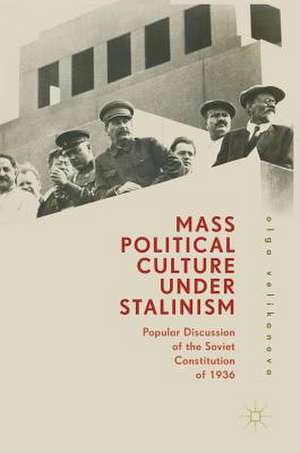Mass Political Culture Under Stalinism: Popular Discussion of the Soviet Constitution of 1936
Autor Olga Velikanovaen Limba Engleză Hardback – 24 mai 2018
The study also covers the government’s goals for the constitution’s revision and the national discussion, and its disappointment with the results. Outcomes of the discussion convinced Stalin that society was not sufficiently Sovietized. Stalin's re-evaluation of society's condition is a new element in the historical picture explaining why politics shifted from the relaxation of 1933-36 to the Great Terror, and why repressions expanded from former oppositionists to the officials and finally to the wider population.
| Toate formatele și edițiile | Preț | Express |
|---|---|---|
| Paperback (1) | 693.90 lei 6-8 săpt. | |
| Springer International Publishing – feb 2019 | 693.90 lei 6-8 săpt. | |
| Hardback (1) | 628.91 lei 3-5 săpt. | +21.10 lei 10-14 zile |
| Springer International Publishing – 24 mai 2018 | 628.91 lei 3-5 săpt. | +21.10 lei 10-14 zile |
Preț: 628.91 lei
Preț vechi: 786.14 lei
-20% Nou
Puncte Express: 943
Preț estimativ în valută:
120.34€ • 125.98$ • 99.57£
120.34€ • 125.98$ • 99.57£
Carte disponibilă
Livrare economică 15-29 martie
Livrare express 04-08 martie pentru 31.09 lei
Preluare comenzi: 021 569.72.76
Specificații
ISBN-13: 9783319784427
ISBN-10: 3319784420
Pagini: 260
Ilustrații: XV, 260 p. 6 illus.
Dimensiuni: 148 x 210 x 18 mm
Greutate: 0.48 kg
Ediția:1st ed. 2018
Editura: Springer International Publishing
Colecția Palgrave Macmillan
Locul publicării:Cham, Switzerland
ISBN-10: 3319784420
Pagini: 260
Ilustrații: XV, 260 p. 6 illus.
Dimensiuni: 148 x 210 x 18 mm
Greutate: 0.48 kg
Ediția:1st ed. 2018
Editura: Springer International Publishing
Colecția Palgrave Macmillan
Locul publicării:Cham, Switzerland
Cuprins
1. Introduction.- 2. Sources.- Part I. Government Goals for the Constitution Revision and National Discussion.- 3. The Origins of Constitutional Reform.- 4. Moderation in the Policies of the Mid-1930s.- 5. Motives for the New Constitution.- 6. Soviet Sociopolitical Mobilizations.- 7. The State’s Goals for the Nationwide Discussion.- Part II. Popular Perceptions of the Constitution.- 8. The Economic Situation at the Grassroots Level.- 9. Liberal Discourse.- 10. Voices against Liberties.- 11. Other Comments and Recommendations.- 12. Outcome of the Discussion: From Relaxation to Repression.- 13. On Russian Political Culture in the Twentieth Century.- 14. Conclusion.
Notă biografică
Olga Velikanova is Associate Professor of History at the University of North Texas, USA. She specializes in Soviet popular opinion studies and works extensively with declassified Communist party and secret police archives relating to the surveillance of the Soviet population. She is author of five books and numerous articles in this area discussing Soviet social mobilization campaigns and popular perceptions of Soviet politics and of Lenin’s image involving historical, anthropological and political culture methods.
Textul de pe ultima copertă
This book is the first full-length study of the Soviet Constitution of 1936, exploring Soviet citizens’ views of constitutional democratic principles and their problematic relationship to the reality of Stalinism. Drawing on archival materials, the book offers an insight into the mass political culture of the mid-1930s in the USSR and thus contributes to wider research on Russian political culture. Popular comments about the constitution show how liberal, democratic and conciliatory discourse co-existed in society with illiberal, confrontational and intolerant views.
The study also covers the government’s goals for the constitution’s revision and the national discussion, and its disappointment with the results. Outcomes of the discussion convinced Stalin that society was not sufficiently Sovietized. Stalin's re-evaluation of society's condition is a new element in the historical picture explaining why politics shifted from the relaxation of 1933-36 to the Great Terror, and why repressions expanded from former oppositionists to the officials and finally to the wider population.
The study also covers the government’s goals for the constitution’s revision and the national discussion, and its disappointment with the results. Outcomes of the discussion convinced Stalin that society was not sufficiently Sovietized. Stalin's re-evaluation of society's condition is a new element in the historical picture explaining why politics shifted from the relaxation of 1933-36 to the Great Terror, and why repressions expanded from former oppositionists to the officials and finally to the wider population.
Caracteristici
First full-length study of the Soviet Constitution of 1936 from the perspective of mass political culture Draws extensively on archival research to reveal popular opinion and comments about Soviet citizens’ values in relation to Stalinist reality Explores the co-existence of liberal and authoritarian ideas in Soviet society and how this dichotomy created tensions among citizens
